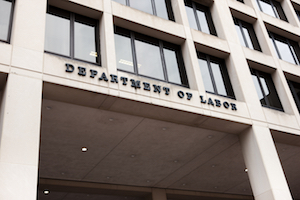 While a small paragraph from Wells Fargo’s annual 10-K filing for 2021 revealed that the Department of Labor (DOL) was reviewing certain transactions associated with the ESOP feature of the company’s 401(k) plan, we now have answers as to what that inquiry concerned.
While a small paragraph from Wells Fargo’s annual 10-K filing for 2021 revealed that the Department of Labor (DOL) was reviewing certain transactions associated with the ESOP feature of the company’s 401(k) plan, we now have answers as to what that inquiry concerned.
The DOL announced Sept. 12 that Wells Fargo has agreed to a multimillion-dollar settlement and penalty after an investigation found that the Wells Fargo 401(k) plan allegedly overpaid for company stock.
Under the terms of the settlement, Wells Fargo and Company, Wells Fargo Bank and plan trustee GreatBanc Trust Company agreed to pay $145 million, of which $131.8 million is allocated for eligible current and former 401(k) plan participants. The firm also agreed to pay a penalty of nearly $13.2 million to the DOL. Wells Fargo and GreatBanc entered the settlement without admitting or denying the allegations made by the department.
DOL’s Investigation
According to the DOL’s announcement, the investigation by the department’s Employee Benefits Security Administration (EBSA) determined Wells Fargo and GreatBanc Trust Company caused the 401(k) plan to pay between $1,033 and $1,090 per share for Wells Fargo preferred stock. Specifically designed for the plan, the stock converted to a set value of $1,000 in Wells Fargo common stock when allocated to participants. In transactions between 2013 and 2018, the plan borrowed money from Wells Fargo to purchase the preferred stock.
In addition to the allegation that Wells Fargo and GreatBanc caused the plan to pay more for stock than it would be worth when deposited in participants’ accounts, EBSA investigators apparently learned that Wells Fargo used the dividends paid on the preferred shares to defray its obligation to make contributions to the 401(k) plan, by using the dividends to repay the stock purchase loans. The investigation revealed the transaction was designed to cause the 401(k) plan to pay more for each share of stock than plan participants would ever receive.
Wells Fargo Statement
A statement by Wells Fargo notes that the company strongly disagrees with the DOL’s allegations and believes it followed applicable laws in conducting the transactions. “Though the Company disagrees with the DOL’s allegations and has not conducted these transactions since 2018, Wells Fargo believes resolving this legacy matter is in the best interest of the Company,” the statement reads.
It adds that, “All 401(k) Plan participants received all matching and profit-sharing contributions due to them. An independent third-party approved the transactions on behalf of the 401(k) Plan and confirmed that the 401(k) Plan did not pay more than fair market value for the Company stock at issue.”
Additional Conditions
As part of the settlement, Wells Fargo also agreed to redeem the remaining convertible preferred stock held by the company’s 401(k) plan in exchange for shares of the company’s common stock. It also agreed to stop using dividends from the convertible preferred shares to repay the stock purchase loans, the DOL notes.
In addition, GreatBanc has agreed to not act as a fiduciary to a public company in connection with any future leveraged transaction involving an employee stock ownership plan, unless the plan acquires only publicly traded stock and pays no more than the fair market value.
“When plan fiduciaries’ actions violate participants and beneficiaries’ trust, the Office of the Solicitor will take appropriate action,” Solicitor of Labor Seema Nanda said in a statement. “This settlement reflects the Department of Labor’s resolve to protect America’s workers’ hard-earned retirement savings and to ensure that plan fiduciaries comply with their legal requirements.”
“The Employee Retirement Income Security Act requires, and participants’ retirement security demands, that when retirement plans purchase employer stock, they pay no more than fair market value,” added EBSA Acting Assistant Secretary Ali Khawar. “This settlement demonstrates that the Employee Benefits Security Administration will not allow participants to be harmed by ERISA plans that overpay for plan assets.”

